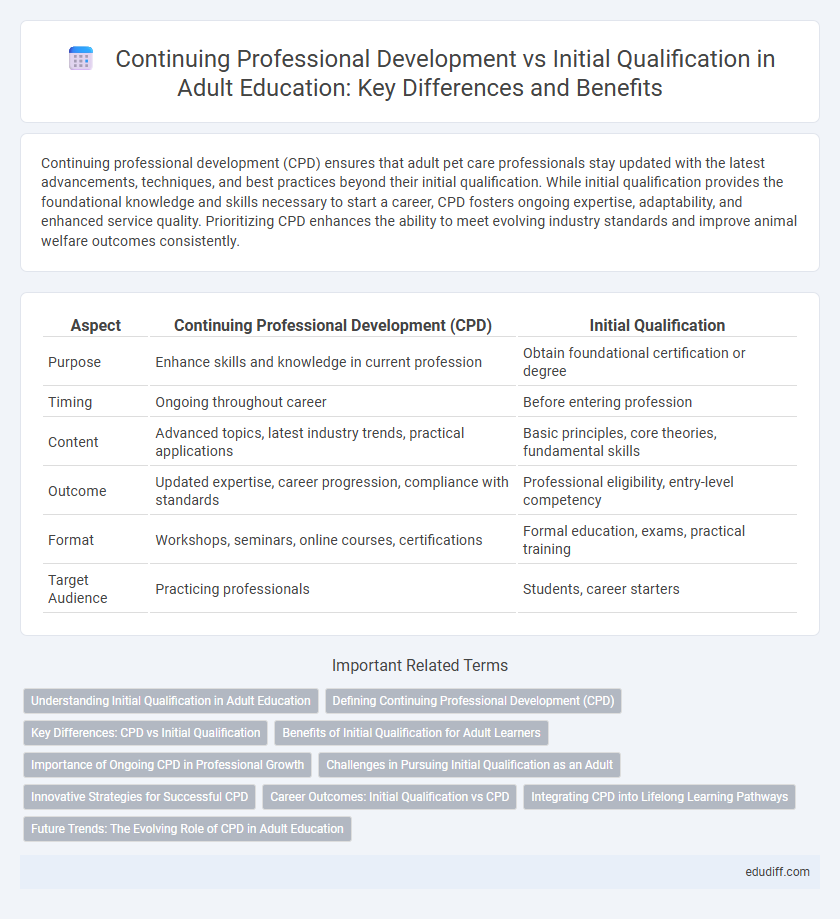Continuing professional development (CPD) ensures that adult pet care professionals stay updated with the latest advancements, techniques, and best practices beyond their initial qualification. While initial qualification provides the foundational knowledge and skills necessary to start a career, CPD fosters ongoing expertise, adaptability, and enhanced service quality. Prioritizing CPD enhances the ability to meet evolving industry standards and improve animal welfare outcomes consistently.
Table of Comparison
| Aspect | Continuing Professional Development (CPD) | Initial Qualification |
|---|---|---|
| Purpose | Enhance skills and knowledge in current profession | Obtain foundational certification or degree |
| Timing | Ongoing throughout career | Before entering profession |
| Content | Advanced topics, latest industry trends, practical applications | Basic principles, core theories, fundamental skills |
| Outcome | Updated expertise, career progression, compliance with standards | Professional eligibility, entry-level competency |
| Format | Workshops, seminars, online courses, certifications | Formal education, exams, practical training |
| Target Audience | Practicing professionals | Students, career starters |
Understanding Initial Qualification in Adult Education
Understanding initial qualification in adult education centers on acquiring foundational skills and credentials that establish professional competence. This stage ensures learners meet essential standards before engaging in complex tasks or specialized fields. Initial qualification serves as the baseline upon which continuing professional development builds ongoing expertise and mastery.
Defining Continuing Professional Development (CPD)
Continuing Professional Development (CPD) encompasses ongoing learning activities that professionals engage in to maintain, enhance, and update their skills and knowledge beyond initial qualification. CPD includes workshops, seminars, online courses, and practical experience designed to ensure competence in a changing industry landscape. Unlike initial qualification, which certifies foundational competence, CPD supports career progression and adaptability in adult learners.
Key Differences: CPD vs Initial Qualification
Continuing Professional Development (CPD) involves ongoing learning activities that professionals undertake to maintain and enhance their skills after obtaining their initial qualification, which is the foundational certification or degree required to enter a profession. CPD emphasizes skill refinement and staying current with industry changes, whereas initial qualifications focus on acquiring the essential knowledge and competencies to begin a career. The key difference lies in CPD being a continuous process throughout a professional's career, while initial qualification is a one-time accomplishment that grants entry into the profession.
Benefits of Initial Qualification for Adult Learners
Initial qualifications provide adult learners with foundational skills and recognized credentials, enhancing employability in competitive job markets. These qualifications establish a credible baseline of knowledge, making it easier for adults to pursue career advancement or transition into new fields. Employers value initial certifications as evidence of competence and commitment, often resulting in higher wages and job stability for adult learners.
Importance of Ongoing CPD in Professional Growth
Ongoing Continuing Professional Development (CPD) is crucial for maintaining expertise and adapting to industry advancements beyond the initial qualification phase. It ensures professionals stay current with evolving standards, technologies, and best practices, thereby enhancing career progression and job performance. Continuous CPD engagement directly impacts professional credibility, competency, and lifelong learning in competitive adult education and workplace environments.
Challenges in Pursuing Initial Qualification as an Adult
Adults pursuing initial qualifications often face significant challenges including balancing education with work and family responsibilities, managing financial constraints, and overcoming gaps in previous academic experience. Time management becomes critical as adults must allocate limited hours for study amid competing personal and professional demands. Furthermore, adapting to modern learning environments and technology can pose additional barriers for those returning to education after a prolonged absence.
Innovative Strategies for Successful CPD
Innovative strategies for successful Continuing Professional Development (CPD) emphasize tailored learning pathways, leveraging digital platforms and interactive technologies to enhance engagement and knowledge retention. Unlike initial qualification programs, CPD prioritizes ongoing skill enhancement through real-time feedback, microlearning modules, and practical application aligned with evolving industry standards. Businesses investing in adaptive learning analytics and virtual mentorship demonstrate higher professional competency and career advancement rates.
Career Outcomes: Initial Qualification vs CPD
Initial qualifications establish foundational skills and enable entry into professional fields, often leading to immediate employment opportunities and career launching points. Continuing professional development (CPD) enhances expertise, keeps knowledge current, and supports career advancement by improving job performance and opening pathways to higher-level roles. Employers increasingly value CPD for demonstrating commitment to lifelong learning and adaptability in evolving industries.
Integrating CPD into Lifelong Learning Pathways
Continuing Professional Development (CPD) enhances skills beyond the Initial Qualification by promoting ongoing learning and adaptability in adult careers. Integrating CPD into lifelong learning pathways supports sustained professional growth, ensuring that competencies evolve in line with industry changes and technological advancements. Embedding CPD within structured frameworks encourages adults to engage in reflective practice, skill renewal, and career progression throughout their working lives.
Future Trends: The Evolving Role of CPD in Adult Education
Continuing professional development (CPD) in adult education is increasingly emphasizing lifelong learning skills and digital competencies to meet evolving workforce demands. Unlike initial qualification, CPD offers updated knowledge and practical skills that align with rapid technological advancements and shifting industry standards. Future trends predict CPD will integrate personalized learning paths and micro-credentials to support continuous adaptation and career progression.
Continuing professional development vs Initial qualification Infographic

 edudiff.com
edudiff.com